If you're considering bariatric surgery, you're not aloneâmany individuals are seeking effective ways to achieve and maintain a healthy weight. This life-changing decision can lead to improved health, increased energy, and a newfound confidence. In this article, we'll explore essential information about the types of bariatric procedures, the benefits and potential risks, and the support available throughout your journey. Join us as we dive deeper into what bariatric surgery entails and find out how it could be the solution you've been looking for!

Patient's Personal Information
Bariatric surgery candidates often undergo a thorough evaluation process before receiving their procedure. Personal information includes crucial details such as full name, age, gender, and current weight. Health history is essential, covering any previous surgeries, chronic illnesses like diabetes or hypertension, and medication use. Lifestyle factors such as diet habits, exercise routines, and psychological evaluations are also significant for surgical planning. Insurance information is required to assess coverage options for the procedure, typically performed in specialized centers like the Cleveland Clinic or the Mayo Clinic. Additional details include emergency contacts, addresses, and primary care physician information, ensuring comprehensive support throughout the surgical journey.
Surgical Procedure Details
Bariatric surgery, a weight loss surgery, encompasses various procedures designed to aid individuals struggling with obesity. The most common types include Gastric Bypass, Sleeve Gastrectomy, and Adjustable Gastric Banding. Gastric Bypass involves creating a small stomach pouch (about the size of a walnut) and rerouting the small intestine, drastically reducing food intake and nutrient absorption. Sleeve Gastrectomy entails removing a large portion of the stomach (approximately 80%), resulting in a sleeve-shaped stomach that limits food intake. Adjustable Gastric Banding places a silicone band around the upper stomach to create a small pouch, adjustable to control food intake. These surgeries generally require a 2-3 hour operation time and a hospital stay of 1-2 days, with recovery periods ranging from 2 to 6 weeks, depending on the individual and procedure. Routine follow-up visits are essential for monitoring progress and nutritional needs post-surgery, contributing to the overall success of long-term weight loss and improved health outcomes.
Preoperative Instructions
Preoperative instructions for bariatric surgery entail crucial guidelines to ensure patient safety and optimal surgical outcomes. Patients must complete a comprehensive evaluation, including consultations with a registered dietitian and a psychologist, ensuring readiness for this life-altering procedure. A significant focus lies on a structured pre-surgery diet, often a low-calorie or meal replacement regimen, typically lasting four to six weeks prior to surgery. Compliance with smoking cessation is paramount, as smoking can increase complications during recovery at facilities like XYZ Medical Center. Additionally, patients should arrange for post-operative support, which includes transportation home, as anesthesia effects can hinder the ability to travel safely. Maintaining hydration and avoiding any medications, such as anti-inflammatories, unless directed by a healthcare professional is equally important. Understanding these preoperative instructions aids in minimizing risks and enhances the likelihood of successful weight loss results following bariatric surgery.
Postoperative Care Plan
Postoperative care after bariatric surgery is crucial for ensuring successful weight loss and overall health improvement. Monitoring vital signs, including blood pressure (maintaining a target of around 120/80 mmHg) and heart rate (ideally between 60-100 beats per minute), is essential within the first 24-48 hours in a clinical setting. Patients should adhere to a clear liquid diet for the initial week post-surgery, gradually transitioning to pureed foods by week two. Adequate protein intake, approximately 60-80 grams per day, is vital for wound healing and muscle preservation, while hydration (aiming for at least 64 ounces of fluid daily) helps prevent complications such as dehydration. Regular follow-up appointments at designated clinics, ideally scheduled every 4-6 weeks during the first six months, are important for monitoring progress, managing potential complications, and addressing nutrition education. Adherence to prescribed vitamin and mineral supplementation, including multivitamins and calcium citrate, should start immediately after surgery to avert deficiencies that can arise post-bariatric procedures.
Contact Information for Queries
Patients seeking information regarding bariatric surgery can contact the dedicated support team via phone at (555) 123-4567 or email at info@bariatricsurgeryclinic.com. The clinic, located at 123 Health Drive, Wellness City, serves as a leading facility recognized for its innovative weight loss solutions and comprehensive care. Operating hours are Monday through Friday, 8 AM to 5 PM, allowing for convenient communication. Additionally, an online portal provides access to resources, enabling patients to familiarize themselves with pre-operative and post-operative care details, nutritional guidance, and support groups designed to ensure a successful weight loss journey.
Letter Template For Patient Bariatric Surgery Information Samples
Letter template of bariatric surgery informational packet for prospective patients
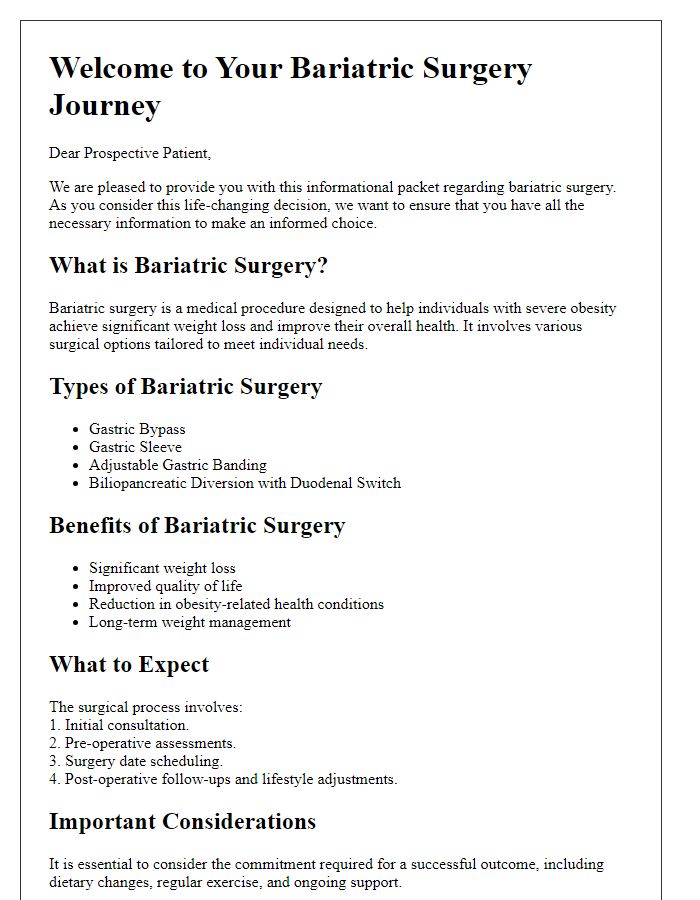
Letter template of preoperative guidelines for bariatric surgery candidates
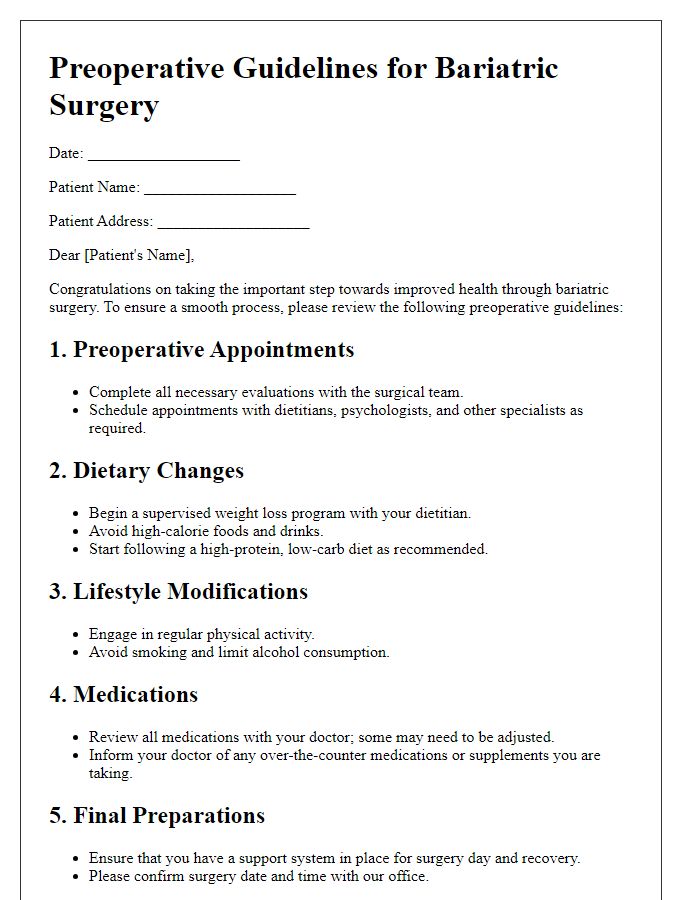
Letter template of post-operative care instructions for bariatric patients
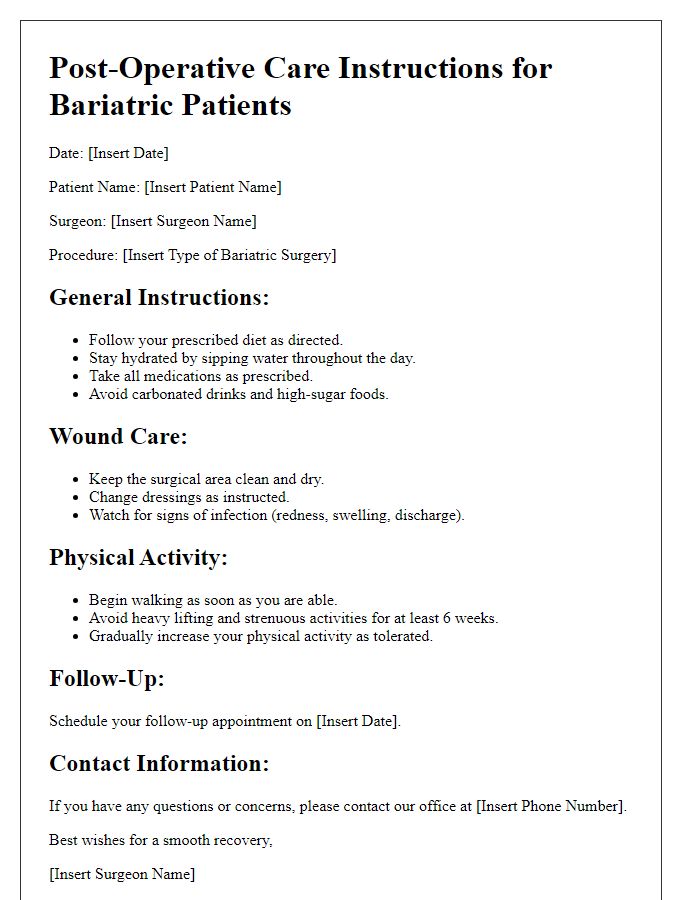
Letter template of emotional support resources for bariatric surgery patients
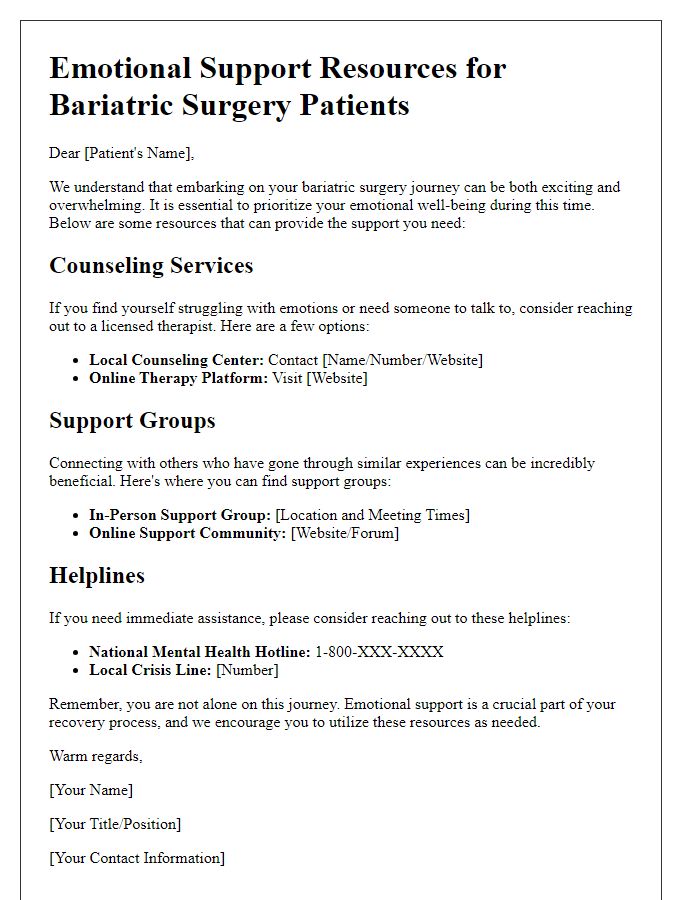
Letter template of patient testimonials for bariatric surgery experiences
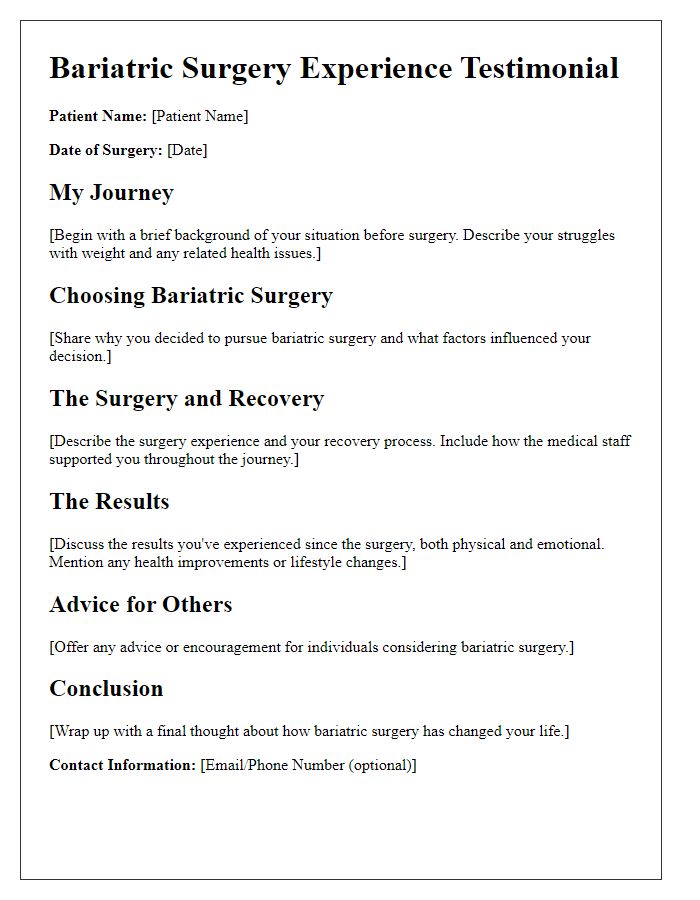
Letter template of appointment scheduling for bariatric surgery consultations
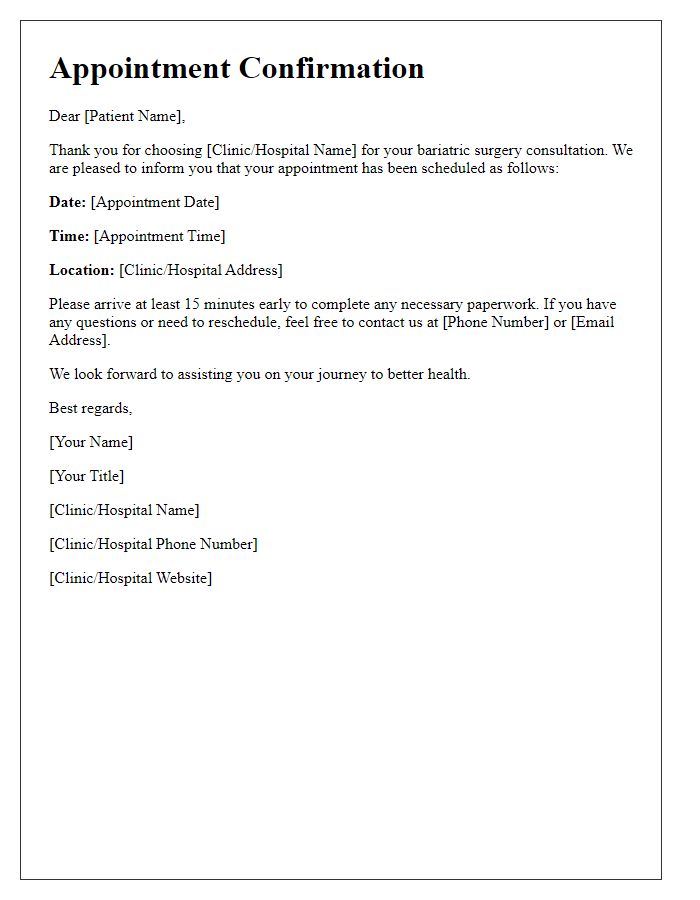

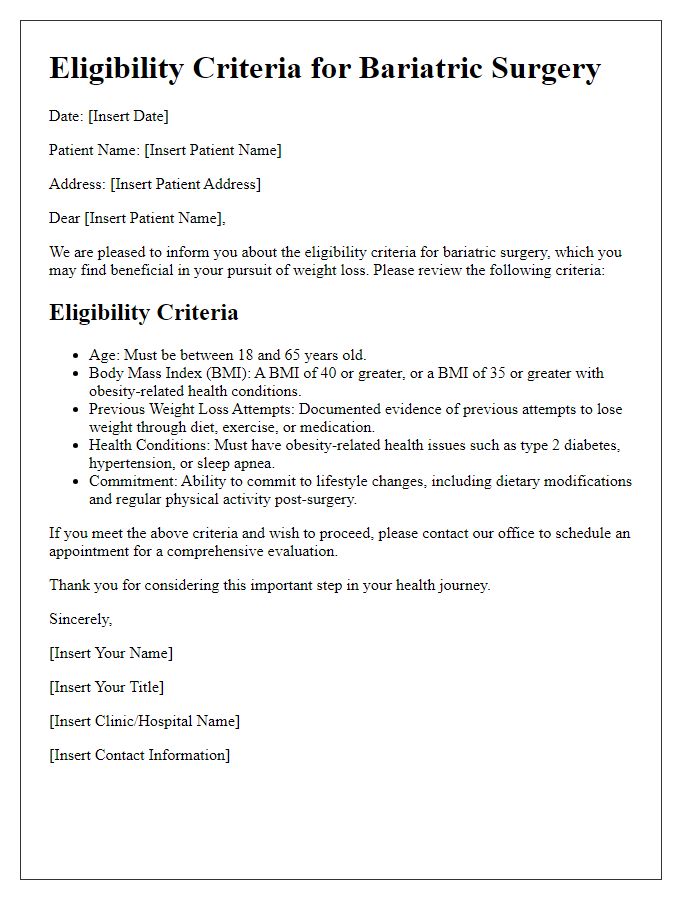
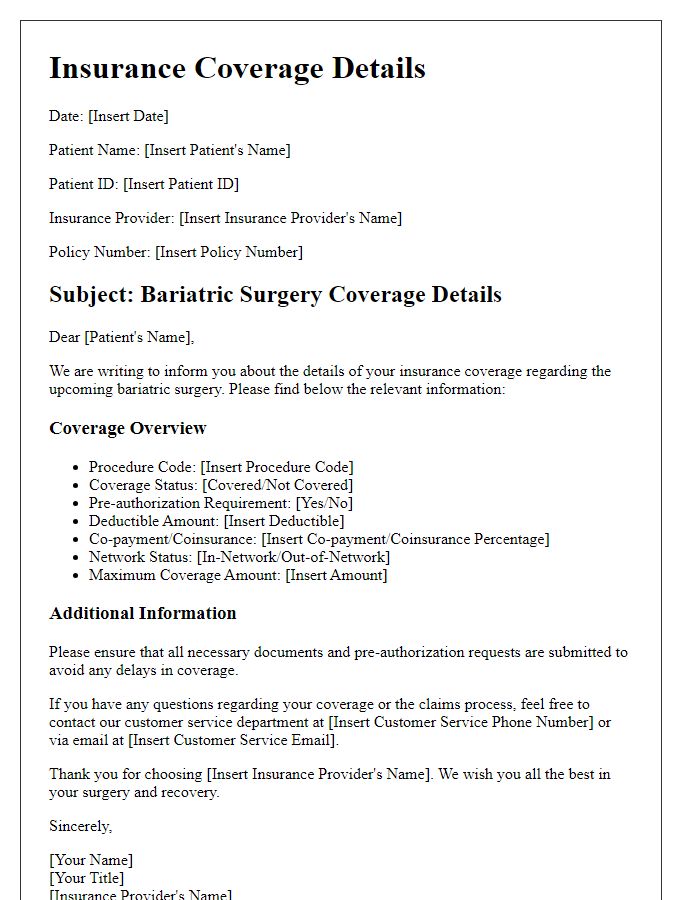
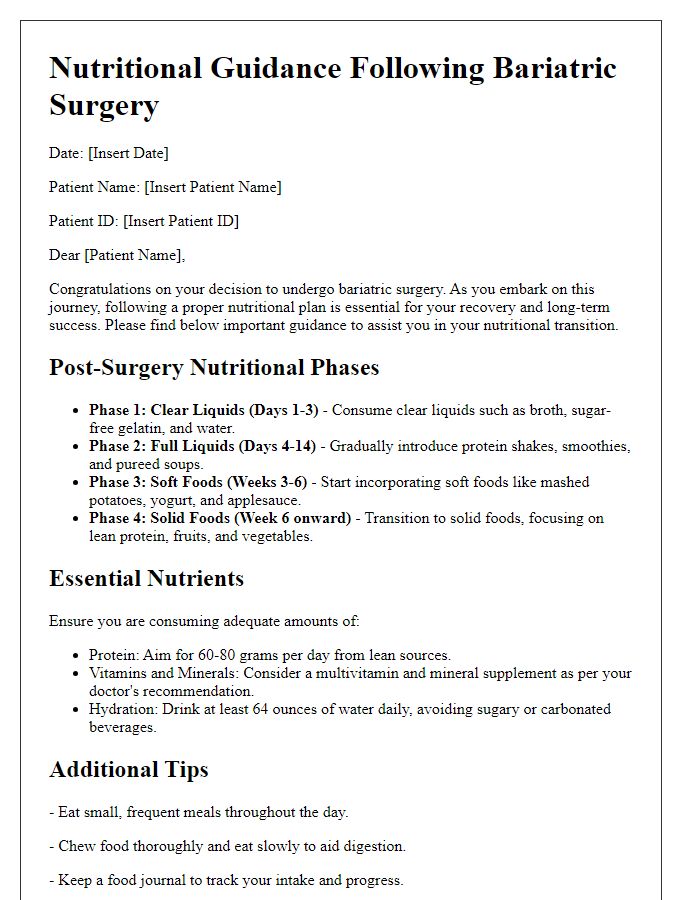
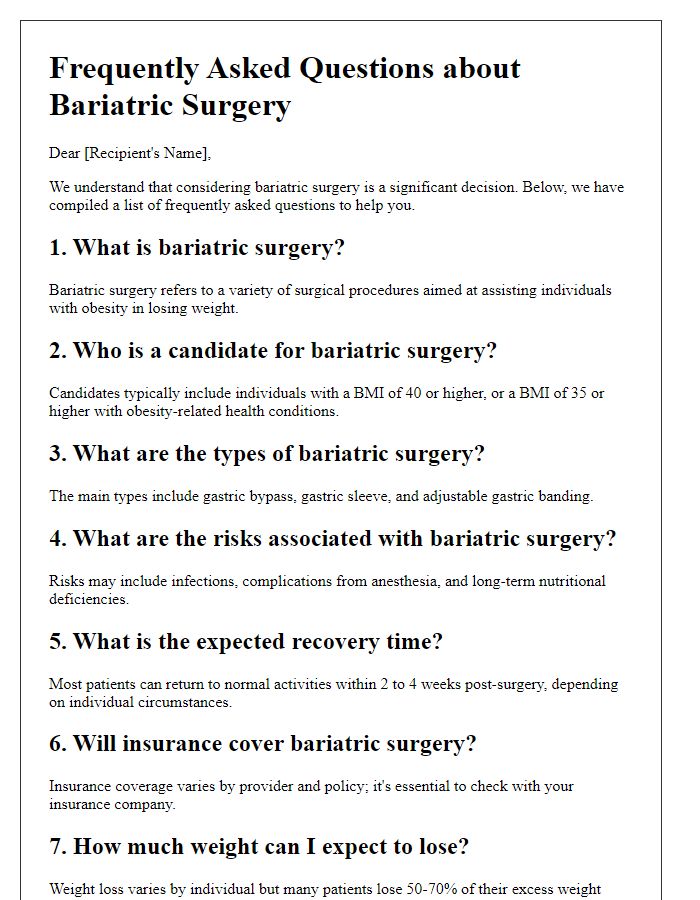


Comments